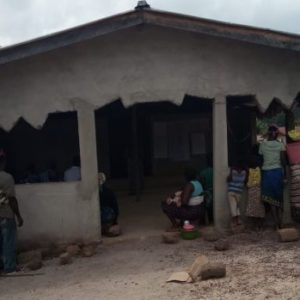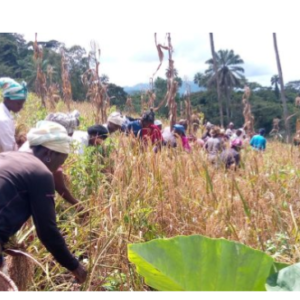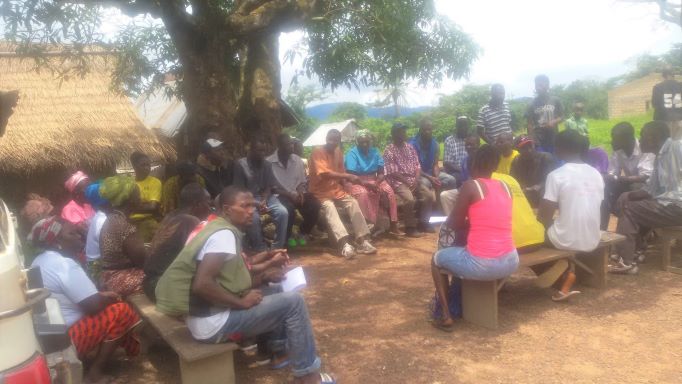PHOTO: Community members assembled under a tree to talk about development in Wobeyanmai
By Fahnie S. Kollie
Collectivism and collaboration have always been a challenge in both urban and rural settings. In rural communities, people are incapacitated and unaware of their rights and the power they possess.
Like many rural villages, communities around Wologizi Mountain were confronted with the issue of abject poverty, vulnerability and abuse resulting from illegal mining and forest activities carried out by local and foreign companies. Six communities including Betibah, Wobeyanmai, Kpademai, Karzah, Darbu, and Bediyeazibah were all victims of unwholesome acts for which they did not derive any benefits.
However, the narratives changed when Green Advocates International (GAI), National Resource Women Platform (NRWP), Alliance for Rural Development (ARD), Village Development Fund (VDF) and Advocates for Community Alternatives (ACA) of Ghana moved in to help.
The partner organizations provided the requisite knowledge, attitude and skills that would enable the locals to be self-reliant and creative in using their available natural resources through collective community action as a way of improving their living conditions and protecting their rights and resources.
A three-year community-driven development project was piloted in the first two communities (Betibah, Wobeyanmai) and later extended to the other four communities.
Green Advocates International’s (GAI) focal point on the program, Mr. John Nimly Brownell, said The Facilitated Collective Action Process (FCAP), was adopted by the partner organizations in the implementation of the project, taking into consideration the local context.
“FCAP is a project implementation approach developed by Spark MicroGrants, which helps communities with capacity building, needs assessment, goal setting, and developing proposals through regular consultations leading to action plans for implementation,” Mr. Brownell elaborated.
Explaining further, the GAI Focal Point said the program implementation process is designed in four stages for a period of three years:
The first Phase I, (Planning Stage) lasts for six to eight months. During this period, weekly meetings are held for at least two hours, with the aim of building community cohesion, leadership, and civic engagement. As a start, the program insists on capacity development with an emphasis on giving each community member, especially women and youth, the space to participate in shaping the community’s development goal. It also serves as a challenge for the community to contribute resources within their limits and identify their own development pathways.
He said phase II (Implementation Stage) also runs between six to eight months with meetings held at least twice a month, focusing on implementing and identifying pathways or projects.
Explaining the third and fourth phases, Mr. Brownell said these are the post-implementation stages, which run for up to twenty months. Phase III is devoted to post-project implementation and monitoring. This time is used to follow up on the operation and how it is benefiting the community and eventually learn lessons for improvement as may be necessary and feasible. “Meetings are held once a month at this point. Phase IV, like the preceding phase, is used for post-project implementation. During this phase, the FCAP facilitator meets with the community once every three months for two hours on a particular day and time chosen by the community.
This explanation is essential to understanding how the various communities engendered a new sense of unity, cohesion and collaboration. The pilot project began with Wobeyamai and Betibah communities in 2018.
Wobeyamai, a small community with a population of over 800 inhabitants, is located around the green forest of Wologizi Mountain. Wildlife, timber, bitter kola, etc. are all resources found in this green forest. The community is inhabited by the Lorma-speaking people who depend largely on subsistence farming for survival.

From meeting under a tree to a Town Hall constructed by the people to escape from the rains
The community generates income from natural resources and uses it to implement projects that are crucial to their existence. Through this means, a modern town hall was built. A resident, Madam Vargula Jallah expressed delight in the program, saying, “The community feels so happy about the presence of the FCAP within the community. We have realized that the FCAP has enabled us to develop our community and improve our livelihood. It helps us to manage our finances, properties and farming.” In line with the FCAP program, money was provided by GAI, VDF and ACA to purchase a rice mill machine for the community.
According to the community dwellers, the purchase of this machine was a relief to most of the locals engaged in rice farming. Importantly, the machine was used as a way to generate income that would go to other projects earmarked by the community.
Betibah community, another beneficiary of the FCAP program is also heavily dependent on farming. The town has a population of about 1,663 inhabitants. It has a self-initiative school that was built by Jesuit Refugee Service, but its operation is now funded by the Parents Teachers Association. This community was concerned about food security. With support from GAI and others, rice farms and other local crops were established for the community.
“The people of Betibah are very proud of the rice farm because it happens to be their first successful project. The community will use the proceeds to implement the various development projects listed in their vision statement. With the rice farm project, they will be able to continuously implement other projects after the end of the FCAP post-implementation phase and the community graduates from the FCAP. The FCAP has provided them with the knowledge of a development plan that is very essential for the development of their community,” said Madam Weedor Zubah, Project Leader.
Based on the success stories from the pilot stage of this project, it was then extended to two additional communities – Kpademai and Karzah.
Kpademai’s population stands at a little over 800 people who mainly speak Lorma. Like Betibah, they too were concerned about food security, for which they cultivated rice and other crops. Kpademai has been able to carry out partnership building, set goals, pathways, create an implementation and operational plans, decide on the sustainability of their farm, and develop a full proposal for the rice farm. The community signed a Grant Agreement with VDF and has started implementing the farming project. In addition to the communion farms, residents still operate their personal farms.

Betibah Village harvests Communion rice farm
Kpademai Town Chief expressed gratitude to GAI and her partners for the level of support since their engagement with them. The chief said: “The introduction of FCAP is a great success for the community as it has trained them in developing project ideas and planning.”
As for Karzah, its population is approximately 549 people. The people have been engaged in self-help initiatives, which led to the construction of a clinic. However, the clinic could not be fully operational because it didn’t meet some basic standards set by the Ministry of Health in Liberia.
Fortunately, an elder of the Karzah Town, Mr. James Wolobah said he was “happy that the project provided funding for the construction of an incinerator, placenta pit and toilets for the clinic to meet some of the minimum standards.’ The health center provides outpatient services, something that was unheard of prior to FCAP.
In 2022, the FCAP program added two new towns, Darbu and Bediyeazibah. Meanwhile, these two communities are going through the planning and identification pathway stages, as the engagements seem to have had a huge impact on the communities. Their livelihoods have improved while uplifting their consciousness to work together as a way of enhancing development and unity in their area.
Meanwhile, with the coming together of Kpademai and Betibah to confront food insecurity, there is a greater chance for a much larger farm that would feed more people and provide jobs. According to the communities, this program has also given women a voice in community development and decision-making.
According to Madam Kebeh Akoi of Betibah, “FCAP has brought our two communities together. The two towns, with self-contributions, are making a large rice farm together to help in developing our communities. We have completed scratching of the rice farm with both communities’ women involved. We have never worked like this before, but the FCAP has taught us to work together for our own benefit and development,” she disclosed.
In furtherance of this collaborative effort, the partner organizations met in Voinjama to discuss the formation of an advocacy group called Citizens Committee Network (CICONET) within primary communities around Wologisi Mountain to enhance collaboration and community harmony.
CICONET is established to serve as the watchdog for community development and rights. It will work with stakeholders in civil society and government for the sustainability of the projects and foster information sharing, promotion of transparency and accountability.
Speaking about the success of FCAP, Green Advocates FCAP Manager, Mr. John Nimly Brownell said, “FCAP embraces gender equality. Women, youth and elders are very active in the FCAP activities. Women’s participation and contributions are key to community decision-making in all the FCAP towns in Lofa County and they are accepted as cohorts.”
Adding, “through our engagements with the Communities, the peoples are using their resources to undertake sustainable collective action to improve living conditions and ensure the recognition and protection of their rights to land and resources in Wologizi.”
Mr. Brownell expressed the hope that the national government will buy into the community-driven development idea and make FCAP an integral part of its development plan for Liberia emulating the example of Rwanda which has embraced Spark’s FCAP methodology.
For further information, please contact greenadvocatesjohnb@gmail.com / Tel: 0886516608

